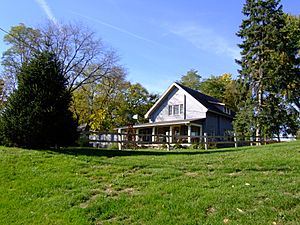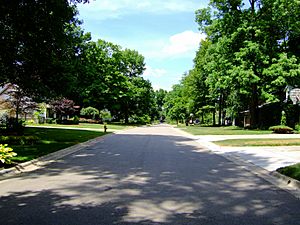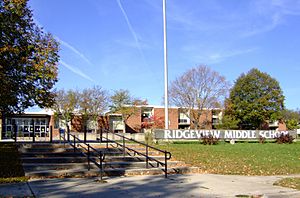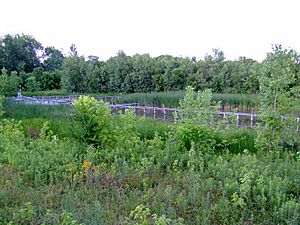Olentangy West (Columbus, Ohio) facts for kids
Quick facts for kids
Olentangy West
|
|
|---|---|
|
Neighborhood in Columbus
|
|
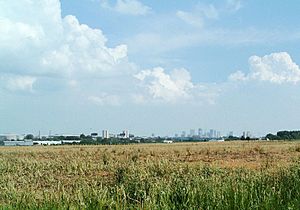
Skyline of Columbus and Ohio State from Olentangy West
|
|
| Country | United States |
| State | Ohio |
| County | Franklin |
| City | Columbus |
| Settled | 1806 |
| Area | |
| • Total | 5 sq mi (10 km2) |
| Elevation | 800 ft (200 m) |
| Population
(2010)
|
|
| • Total | 11,765 |
| Time zone | UTC-5 (EST) |
| • Summer (DST) | UTC-4 (EDT) |
| ZIP Codes |
43202, 43214, 43220, 43221
|
| Area code(s) | 614 |
Olentangy West is a neighborhood in Columbus, Ohio, United States. It is about 5 miles (8 km) northwest of downtown Columbus. This area is mostly homes. However, it also has a large hospital called Riverside Methodist Hospital. The main office for Chemical Abstracts Service is here too. The west part of Ohio State University is also in the southern part of Olentangy West.
Contents
A Look at Olentangy West's Past
The land that is now Olentangy West was first set aside for soldiers. These soldiers fought in the American Revolutionary War. They received land as payment for their service. Later, in 1806, families started settling here.
Simon and Alexander Shattuck were important landowners. They moved from Massachusetts and farmed the land. They even started a small settlement called "Shattucksburg." A schoolhouse was built nearby in 1856. Today, it is a private home. Union Cemetery started in 1847. It is now one of the biggest cemeteries in Columbus.
In 1828, Olentangy River Road was built. This road connected the area to other towns. A railroad came in 1876. It is still used today for freight trains. In 1939, a bridge was built over the Olentangy River. This helped connect the area better.
In the late 1940s, a scientist named John D. Kraus built a Radio telescope here. It was the first version of what became known as the Big Ear. This project later moved to a new location. Even though the site is empty now, you can still see parts of the old buildings.
The area really started to grow in the 1950s. Many new families wanted homes outside the busy city. Olentangy River Road was made wider in 1956. A shopping center was built in 1961. As more people moved in, traffic became a big problem. So, a new highway, State Route 315, was planned.
Building the highway was tricky. Ohio State University did not want the road to go through its campus. So, the road's path was changed. This new path meant buying land from a cemetery. The cemetery owners did not want to sell. After many years, a solution was found. The highway section through the cemetery was finished in 1975. The entire highway was completed in 1980.
Today, Olentangy West is a popular place to live. It is quiet and safe, but still close to the city.
Who Lives in Olentangy West?
In 2010, about 11,765 people lived in Olentangy West. There were nearly 6,000 households. Most residents (about 72%) are White. About 18% are Asian, and 6% are Black. The average household has about 2 people.
Many students from Ohio State University live here. This includes graduate students. The Buckeye Village housing area is home to many international students. About 85% of people there are from other countries. More than half of the people in Olentangy West rent their homes. However, in the smaller neighborhoods, most houses are owned by the people who live in them.
In 2000, almost everyone (95%) had a high school diploma. Half of the adults had a college degree or higher.
Learning in Olentangy West
Olentangy West has many schools for kids of all ages. For younger children, there are several Pre-kindergarten schools. These include Arlington Children's Center and OSU Childcare Center.
For older students, there are public and private schools. Public elementary schools are Cranbrook and Winterset. Ecolé Kenwood is a special French immersion school. It teaches students in French from kindergarten to 8th grade. Ridgeview Middle School serves students in grades 6-8.
Centennial High School is just north of Olentangy West. It is known as one of the best high schools in the U.S. The Metro School is also located here. For private education, there is St. Timothy School, a Catholic school.
Working in Olentangy West
About 25,000 people work in Olentangy West. A lot of jobs (about 16,000) are in healthcare. This is because of Riverside Hospital. Retail stores also employ about 2,000 people.
The Ohio State University bought a large building here in 2002. They use it for offices and labs. The main office for Commerce National Bank is also in Olentangy West. The Ohio Supercomputer Center is located in the southern part of the area.
Neighborhoods within Olentangy West
Olentangy West has several smaller areas, each with its own feel:
- Riverview - This is the largest area by population. It includes the University City Shopping Center.
- Cranbrook - This area has several smaller parts like Shady Hill Estates.
- Brentwood Park - This area includes Greenfield Estates.
- Kendale - This area is named after its main subdivision.
- Knolls Thomas - This part includes the historic Marburn subdivision.
- Knolls West - This area has the Kenny Centre shopping center.
- Shattucksburg - This used to be a neighborhood with homes. Now, it has mostly businesses and warehouses.
Getting Around Olentangy West
It's easy to get around Olentangy West by car. State Route 315 runs through the area. Other main roads include North Broadway and Henderson Road.
The COTA provides bus service here. Ohio State University also has a free bus service called CABS. It connects some neighborhoods to the main campus.
Bicycling is also popular. The Olentangy Trail runs along the eastern edge of the Olentangy River. There are also multi-use trails along Henderson Road and Olentangy River Road.
Media and News
The local news for Olentangy West is the weekly Northwest News. It is part of ThisWeek Community News. The studios for WOSU-FM (radio) and WOSU-TV (television) are located in the southern part of the area. Another TV station, WCMH-TV, also has its main studio on Olentangy River Road.
Parks and Green Spaces
The largest green space is Ohio State's west campus. It has the Waterman Agricultural and Natural Resources Laboratory. This lab has a working dairy farm and areas for studying plants and wetlands. The Chadwick Arboretum is also here. It is a 60-acre (24 ha) garden.
Other parks include Fred Beekman Park and the Wilma H. Schiermeier Olentangy River Wetland Research Park. Whetstone Park is also nearby. It includes the beautiful Park of Roses. Union Cemetery is also a great place for birdwatching. Many different kinds of birds visit the grounds.


